Minister for Security
The Minister for Security is a ministerial position in the Home Office. The post was created by Prime Minister Gordon Brown on 3 June 2009 by splitting the now-defunct post of the Minister for Security, Counter-Terrorism, Crime and Policing between this post (then called Minister for Security and Counter-Terrorism) and the new post of Minister for Crime and Policing.
| United Kingdom Minister of State for Security | |
|---|---|
.svg.png) Royal Arms as used by the Her Majesty's Government | |
 | |
| Home Office | |
| Style | The Right Honourable (Formal prefix) Security Minister (Informal) |
| Reports to | The Home Secretary |
| Seat | Westminster, London |
| Appointer | The British Monarch on advice of the Prime Minister |
| Term length | At Her Majesty's pleasure |
| Inaugural holder | Beverley Hughes |
| Formation | 29 May 2002 |
| Website | gov.uk |
The current postholder is James Brokenshire MP, appointed by Boris Johnson in 2020. The previous Security Minister, Lady Neville-Jones, resigned in May 2011 to be replaced as Minister of State at the Home Office by Lady Browning, while her brief at the Home Office for Security was taken on by James Brokenshire but only as a Parliamentary Under-Secretary of State.[1] Following the resignation on 8 February 2014 of the Minister of State for Immigration, Mark Harper, the position was temporarily merged with that of Minister for Security. James Brokenshire assumed the enlarged role of Minister for Security and Immigration. The two posts were divided again on 8 May 2015.
Ministers
| Name (portfolio) |
Portrait | Term of office | Political party | P.M. | Home Sec. | |||
|---|---|---|---|---|---|---|---|---|
| Beverley Hughes (Citizenship, Immigration and Counter Terrorism)[2] |
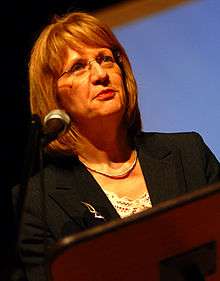 |
29 May 2002 | 1 April 2004 | Labour | Blair | Blunkett | ||
| Hazel Blears (Crime Reduction, Policing, Community Safety and Counter-Terrorism)[3] |
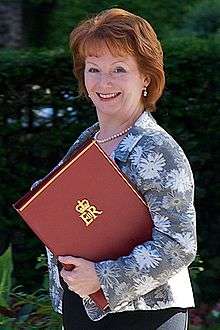 |
13 June 2003 | 6 May 2005 | Labour | ||||
| Hazel Blears (Policing, Security and Community Safety)[3] |
6 May 2005 | 5 May 2006 | Clarke | |||||
| Tony McNulty (Security, Counter-Terrorism, Crime and Policing) |
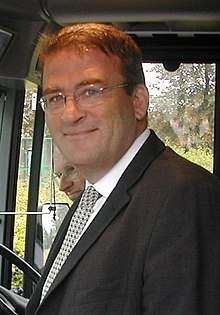 |
5 May 2006 | 3 October 2008 | Labour | Reid | |||
| Brown | Smith | |||||||
| Vernon Coaker (Policing, Crime and Security)[4] |
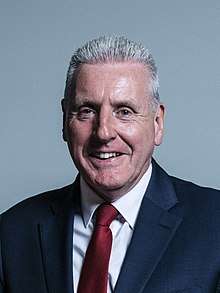 |
3 October 2008 | 3 June 2009 | Labour | ||||
| David Hanson (Security, Counter-Terrorism, Crime and Policing) |
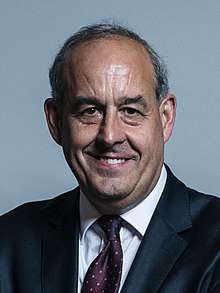 |
10 June 2009 | 11 May 2010 | Labour | Johnson | |||
| Admiral The Lord West of Spithead (Security and Counter-Terrorism) |
.jpg) |
28 June 2007 | 12 May 2010 | Labour | ||||
| The Baroness Neville-Jones (Security and Counter-Terrorism)[5][6] |
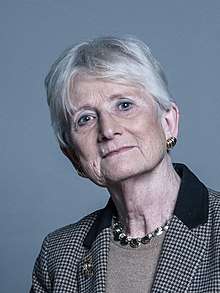 |
12 May 2010 | 9 May 2011 | Conservative | Cameron | May | ||
| James Brokenshire[7] (Crime and Security, Security and Immigration)[1] |
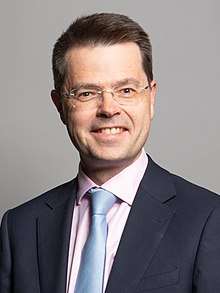 |
9 May 2011 | 8 May 2015 | Conservative | ||||
| John Hayes (Security) |
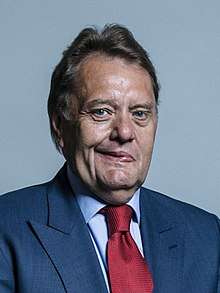 |
8 May 2015 | 15 July 2016 | Conservative | ||||
| Ben Wallace (Security and Economic Crime) |
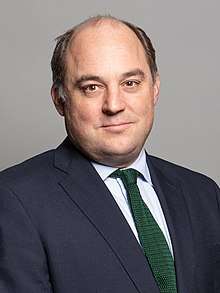 |
17 July 2016 | 24 July 2019 | Conservative | May | Rudd | ||
| Javid | ||||||||
| Brandon Lewis (Security and Deputy for Brexit) Also attends Cabinet |
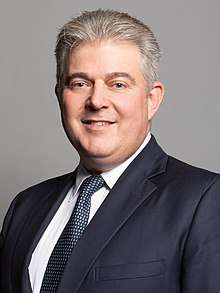 |
24 July 2019 | 13 February 2020 | Conservative | Johnson | Patel | ||
| James Brokenshire (Security) |
 |
13 February 2020 | Incumbent | |||||
References
- Home Office: Our Ministers
- "Baroness Hughes of Stretford - Parliamentary Career". Archived from the original on 2010-12-27.
- "Hazel Blears - Parliamentary Career". Archived from the original on 2011-12-21.
- "Vernon Coaker - Parliamentary Career". Archived from the original on 2011-10-11.
- http://www.homeoffice.gov.uk/about-us/our-organisation/ministers/pauline-neville-jones/
- Page 40 Archived 2012-04-02 at the Wayback Machine
- Johnson, Wesley (12 May 2011). "James Brokenshire takes on security role". Independent. Retrieved 12 May 2011.
.svg.png)